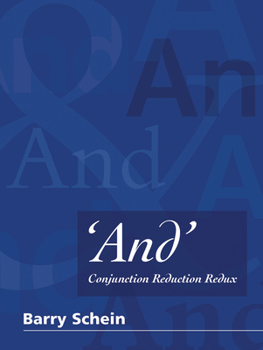'And': Conjunction Reduction Redux
In this book, Barry Schein argues that "and" is always the sentential logical connective with the same, one, meaning. "And" always means "&," across the varied constructions in which it is tokened in natural language. Schein examines the constructions that challenge his thesis, and shows that the objections disappear when these constructions are translated into Eventish, a neo-Davidsonian event semantics, and, enlarged with Cinerama Semantics, a vocabulary for spatial orientation and navigation. Besides rescuing "and" from ambiguity, Eventish and Cinerama Semantics solve general puzzles of grammar and meaning unrelated to conjunction, revealing the book's central thesis in the process: aspects of meaning mistakenly attributed to "and" are discovered to reflect neighboring structures previously unseen and unacknowledged.
Schein argues that Eventish and Cinerama Semantics offer a fundamental revision to clause structure and what aspects of meaning are represented therein. Eventish is distinguished by four features: supermonadicity, which enlarges verbal decomposition so that every argument relates to its own event; descriptive event anaphora, which replaces simple event variables with silent descriptive pronouns; adverbialization, which interposes adverbials derived from the descriptive content of every DP; and AdrPs, which replace all NPs with Address Phrases that locate what nominals denote within scenes or frames of reference.
With 'And, ' Schein rehabilitates an old rule of transformational, generative grammar, answering the challenges to it exhaustively and meticulously.





